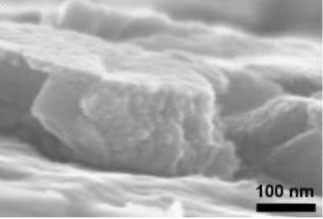Nov
19
Keeping That Lithium Ion Battery Working
November 19, 2020 | Leave a Comment
A University of Central Florida researcher is working to make portable devices and electric vehicles stay charged longer by extending the life of the rechargeable lithium-ion batteries powering them. He is doing this by making the batteries more efficient, with some of his latest work focusing on keeping the anode from falling apart over time.

Secondary electron micrograph cross section of Cu-Sn@Sn Film. Image Credit: University of Central Florida. Click image for the largest view.
Assistant Professor Yang Yang is doing this by making the batteries more efficient, with some of his latest work focusing on keeping an internal metal structure, the anode, from falling apart over time by applying a thin, film-like coating of copper and tin.
The new technique is detailed in a recent study in the journal Advanced Materials.
An anode generates electrons that travel to a similar structure, the cathode, inside the battery, thus creating a current and power.
Yang, who is with UCF’s NanoScience Technology Center said, “Our work has shown that the rate of degradation of the anode can be reduced by more than 1,000 percent by using a copper-tin film compared to a tin film that is often used.”
Yang is an expert in battery improvement including making them safer and able to withstand extreme temperatures.
Yang explained he technique is unique because of its use of the copper-tin alloy and is an important improvement in stabilizing rechargeable battery performance. It is also scalable for use in the smallest smartphone battery to larger batteries that power electric cars and trucks.
“We are motivated by our most recent research progress in alloyed materials for various applications,” he said. “Each alloy is unique in composition, structure and property.”
One wants to thank Yang for his work. It does seem odd that this observation has taken so long to be noticed. One hopes manufacturers take note right away.

